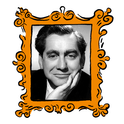In 2003 Errol Morris made The Fog of War, an extraordinary portrait of Robert S McNamara, who served as US Secretary of Defense during the Vietnam War. That film, which won the Oscar for Best Documentary, was based on over 20 hours of interviews that Morris conducted with McNamara. Now he has made a sequel of sorts, The Unknown Known, which focuses on Donald Rumsfeld’s time as Secretary of Defense during the Iraq War. It is, in Morris’s words, “history from the inside-out”—an investigation of the way Rumsfeld sees himself and the chain of events that led to the Iraq war. I sat down with Morris to discuss why Rumsfeld agreed to make the movie, whether he is a “true believer” and his similarity to Humpty Dumpty and the Jabberwock.
What attracted you to making a film about Donald Rumsfeld, rather than other members of the Bush administration?
Part of the attraction was the salt and pepper shaker idea. Two disastrous wars, two secretaries of defense, separated by 40 years, more or less. I don’t think there was anything more than that. Two individuals who, for better or worse, were the popular faces of these wars—to the extent that you still hear Vietnam referred to as “McNamara’s war,” as if it represented primarily his policies and not Johnson’s, something by the way that I do not believe.
In his unwillingness to admit any error, Rumsfeld reminded me less of McNamara than Fred Leuchter, the execution technician and Holocaust denier who is the main character in your film Mr Death.
McNamara is unlike many of my characters: more self-aware, more guilt-ridden, more despairing. Fred is absolutely convinced of his own rectitude. He has no doubt that what he believes is the truth. He seems to have this interest in empiricism, paying lip-service to evidence, when the reality of it is something very close to the opposite. It’s evidence merely serving to justify prior belief.
Is there any link to the way Rumsfeld approaches the world?
They’re different, but if I’ve made movies about certain kinds of clueless characters, Rumsfeld is certainly among them. People asked me repeatedly when The Unknown Known was first shown whether Rumsfeld was like McNamara, and I said no, he’s more like Joyce McKinney [the subject of Morris’s previous film, Tabloid].
I understand you first made contact with Rumsfeld by sending him a copy of The Fog of War, along with a letter asking whether he might consider making a film with you. How did he respond?
He invited me to come to Washington and meet with him. I spent an extraordinary afternoon with him. He showed me a piece of an anti-ballistic-missile missile, this crumpled piece of metal, and said “Who says you can’t shoot down a missile with a missile?” And he agreed to make the movie.
I should make one thing absolutely clear. Rumsfeld was entirely co-operative. Overwhelmingly co-operative. He made available his personal memos, the “snowflakes.” These have never been shown publically before. I don’t believe I was shown classified memos but I was shown most, if not all, of the unclassified memos. And that became the basis of the film.
What surprised you about Rumsfeld when you first met him?
Everything surprised me. He was extremely charming, incredibly friendly. He asked me to sit in on a series of press interviews. He was on speakerphone and I sat next to him in his conference room.
Why do you think he did that?
His appearances with the press, including his appearance in my film, seem like performances. Since my film is almost all first person, it’s a story about how he sees himself. It’s a story about self-presentation. It makes it harder to tell certain kinds of things but easier to tell that.
To what extent do you think Rumsfeld is consciously performing himself?
It’s hard to know. Someone at the Q&A last night asked was he different when the cameras were turned off. And the answer is no. But I have my hunch. My suspicion is that with Rumsfeld what you see is what you get. It may be performance but the performance is such that it has become who he is.
There are moments where he reveals himself in this movie. I asked Rumsfeld to read the Haynes memo [in which the Defense Department's General Counsel, William J Haynes II, sets out specific techniques for interrogation that can be used on detainees at Guantanamo Bay]. Rumsfeld wrote this infamous comment on the memo, in which he says I don’t see the problem with detainees being made to stand for hours, I stand for hours at my desk at the Pentagon. So in the movie, Rumsfeld goes through this recitation of so-called enhanced interrogation techniques and then he interrupts himself at the end, and says “Good grief, that’s a pile of stuff!”
I thought, what does this mean? Is he reading this memo for the first time? Is he for a moment shocked by what he’s reading? You could ask the question, is he lying? Well, lying would be kind of okay. But what if he’s not lying? That’s so much worse! If he’s telling the truth, that’s the most appalling thought of all. Lying is interesting as a concept, because part of what we consider to be lying is someone knowingly telling a falsehood. But I was left with the feeling of a true believer with Rumsfeld.
So when he says something like the main lesson he took from the war in Vietnam is that “Some things work out. Some don’t. That didn’t,” he means it?
It’s extraordinary in its emptiness. It’s staggeringly vapid, or to use one of my favourite words, jejune.
He can’t really think just that can he?
That’s the central mystery of him and of the movie. Someone asked at another Q&A here, “Do you feel that he’s sincere?” I do. The smile, the infernal grin—is that sincere? Yes! I think it’s absolutely sincere. It registers a level of enormous self-satisfaction. What’s so frightening, distressing even, about him, is that this stuff seemingly is genuine.












